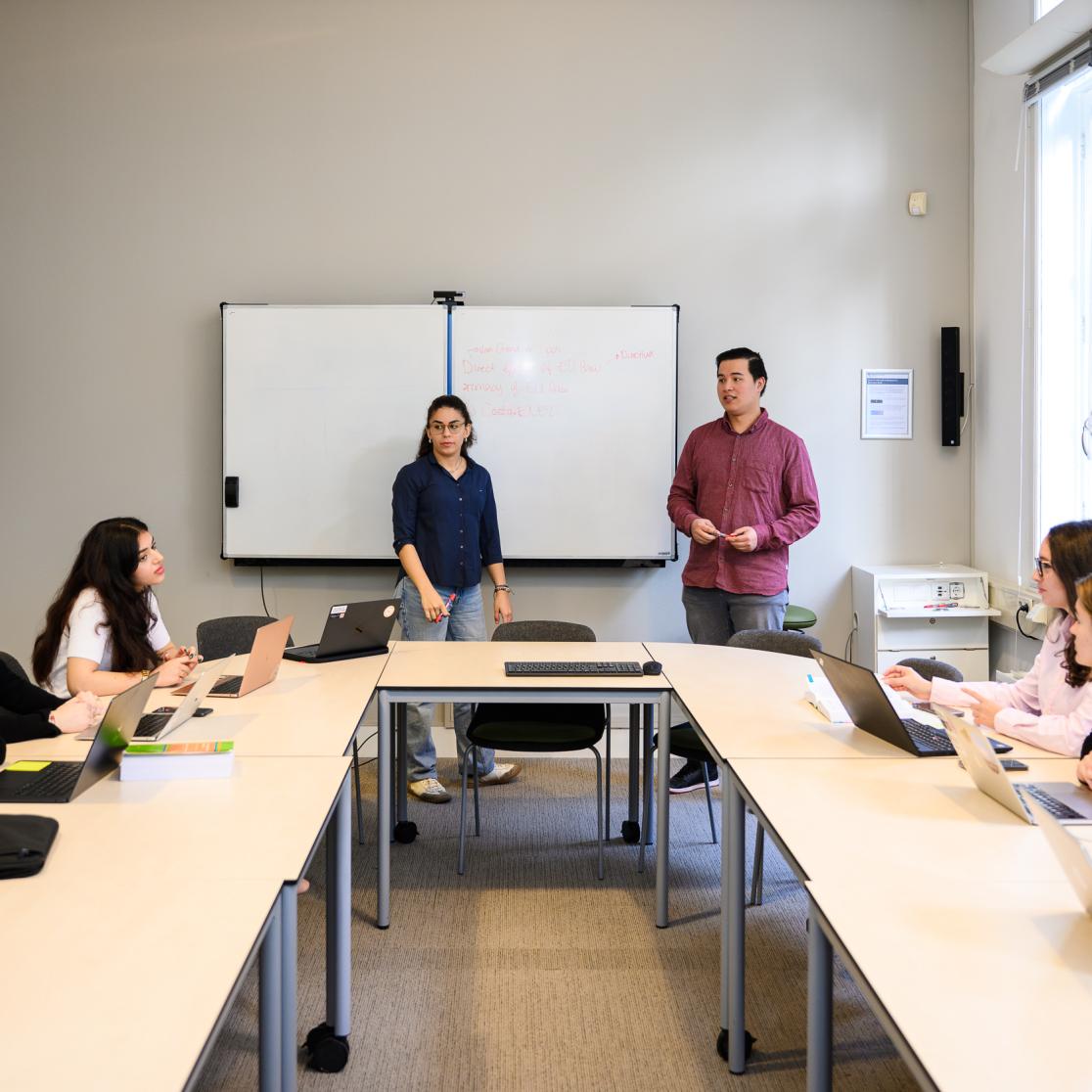Education
The Maastricht Institute for Law in Education (MILE) is the Faculty of Law’s hub for educational development and innovation. We support teaching staff in developing and strengthening their educational practice through a range of activities. Our approach is informed by Maastricht University’s vision on education as well as the research into legal education conducted within MILE.
Through our education development work, we aim to support legal educators to teach future legal professionals who think critically, learn independently, and collaborate effectively.
Our education development work centres on four main areas:
- Supporting new teachers through onboarding
- Enabling ongoing professional development
- Fostering career growth in education
- Building a collaborative learning community

MILE Education Development
Supporting New Teachers - Onboarding
All new teaching staff are offered an onboarding programme that introduces them to the educational approach used at Maastricht University. A core part of this is the PBL and tutor training, in which participants explore the underlying principles of Problem-Based Learning (PBL) and the role of the tutor within our faculty. The training combines theoretical insight with practical guidance, helping new colleagues develop the knowledge and skills needed to facilitate small-group learning, guide student discussions, and support independent learning in a legal context.
This early support ensures that new teachers are well-prepared to begin teaching and can contribute confidently to the faculty’s learning environment from the start.
We also identify and prepare talented students to act as PBL tutors. This not only strengthens our teaching community, but also provides an opportunity for students who are interested in academic teaching to gain early experience and develop their skills in a supported setting.
Developing Educational Practice – Professional Development
All academic teaching staff are expected to obtain the University Teaching Qualification (UTQ), a nationally recognised qualification that certifies that a university teacher is competent in course design, teaching delivery, assessment, and professional conduct. At the Faculty of Law, the UTQ is offered by MILE. The programme combines structured workshops, individual assignments, and observation of teaching practice, with a focus on the specific context of legal education at Maastricht.
The UTQ lays the foundation for competent and reflective teaching. Once completed, it is followed by a process of ongoing development through Continuing Professional Development (CPD). MILE offers a range of CPD activities, including workshops, thematic modules, peer observation, intervision, reading groups, and opportunities to explore educational research.
Together, the UTQ and CPD not only support the ongoing development of educational expertise, but also contributes to the quality and consistency of legal education within the faculty.
Fostering Educational Careers – Career Development
MILE offers a supportive development trajectory for early-career legal educators, particularly teaching fellows (docent 4) hired through MILE. This trajectory is designed to help new teachers grow into confident and competent academic educators in law by deepening their pedagogical knowledge, strengthening their teaching skills, and expanding their understanding of legal education.
For teaching fellows who wish to take the next step in their educational careers, MILE offers an Academic Teacher Trajectory, a development programme that supports the transition to the role of Academic Teacher (docent 3). The trajectory combines advanced seminars on curriculum design, assessment, and educational leadership with an individual project and a reflective teaching portfolio. Participants are guided throughout the process by experienced educators and educational developers.
A key aim of this trajectory is to support participants in developing as scholarly teachers: educators who not only design and deliver high-quality legal education, but also reflect on their practice through a scholarly lens and engage with broader questions about the purpose, design, and impact of legal education. In this way, the trajectory not only prepares them for more senior teaching roles but also positions them as contributors to the ongoing improvement of legal education.
In addition to these trajectories, MILE aims to provide coaching and mentoring opportunities for academic staff who are interested in developing their profile in the field of educational development and innovation. These one-to-one or peer-based formats offer space for reflection, feedback, and support in shaping a path as an educator, curriculum designer, or educational leader
Building a Learning Community
One of MILE’s core aims is to contribute to creating a strong learning community within the Faculty of Law, which is essential to sustaining high-quality education. MILE fosters this sense of community by creating space for open dialogue about teaching and learning.
Through initiatives such as Learning@Law lunches, intervision groups, and peer observation, teaching staff are invited to share experiences, raise questions, and reflect together on educational practice. These are not formal training sessions, but opportunities for meaningful conversation among colleagues who care about teaching.
MILE also coordinates the Faculty’s Teacher Information Point (TIP). TIP serves as a first point of contact for questions about teaching, assessment, course coordination, or educational development and innovation.
Together, these initiatives help create a community in which teaching is recognised, supported, and continually developed in conversation with others.